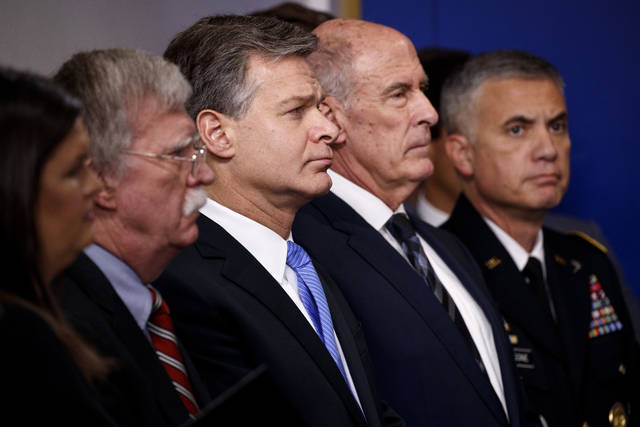WASHINGTON — Responding to wide-ranging criticism that it lacked a clear national strategy to protect U.S. elections, the Trump administration put on a show of force Thursday and said the president had directed a “vast, government-wide effort” to safeguard a cornerstone of American democracy.
John Bolton, the national security adviser, also wrote in a letter to Senate Democrats that “President Trump has not and will not tolerate interference in America’s system of representative government.”
The warning to American adversaries came as top U.S. intelligence and homeland security officials raised alarms about potential efforts to influence the 2018 and 2020 elections. Homeland security chief Kirstjen Nielsen said: “Our democracy is in the crosshairs.”
“We continue to see a pervasive messaging campaign by Russia to try to weaken and divide the United States,” Director of National Intelligence Dan Coats said.
Their rare appearance during a White House briefing came as a display of resolve, weeks after Trump publicly undermined the conclusions of American intelligence agencies regarding Russian interference. After suffering a bipartisan outcry, Trump later said he accepted those findings.
Along with National Security Agency Director Paul Nakasone and FBI Director Christopher Wray, they appeared together at the White House on Thursday to try to reassure the American people they are doing everything in their power to address the threat.
“We’re throwing everything at it,” Coats said.
Nakasone, who is also the commander of the U.S. Cyber Command, said the command and the NSA are both tracking a wide range of foreign cyber adversaries and “are prepared to conduct operations against those actors attempting to undermine our nation’s midterm elections.”
Nakasone did not divulge details of the U.S. cyber playbook or say what U.S. responses might have already taken place, saying the operations are sensitive and require confidentiality to achieve success. “I won’t discuss the specifics, except to state that our forces are well-trained, ready and very capable,” he said.
At one of his confirmation hearings in March, Nakasone said his role was to provide a series of cyber options that might be used as a deterrent to Russian meddling, but he told Congress then that cyber or military options might not be the most effective. “In fact, it may be less effective than other options that might be considered,” he said.
Asked specifically if he had been ordered or authorized to conduct any offensive cyber operations in response to foreign meddling in the U.S., Nakasone offered a vague response. “So my guidance and the direction from the present secretary of defense is very clear, we’re not going to accept meddling in the elections. And it’s very unambiguous.”
Nielsen, Wray and Nakasone had all gathered earlier this week in New York City with leaders of top finance, energy and telecommunications companies for a cybersecurity summit, where they spoke of the urgent need for a collective, collaborative approach to security.
At the event, Nielsen said the cyber threat now exceeds the danger of a physical attack against the U.S. by a hostile foreign group.
Wray told reporters that compared to 2016, in 2018 “we are not yet seeing the same kind of efforts to specifically target election infrastructure,” but that other efforts to influence public opinion continue. He added that the FBI has active investigations on foreign influence across all 56 of its field offices.
“Make no mistake, the scope of this foreign influence threat is both broad and deep,” he said.
But Nielsen said U.S. agencies have “seen a willingness and a capability on the part of the Russians” to attack U.S. election infrastructure.
On Capitol Hill, lawmakers in both parties have pushed election security toward the top of the fall agenda amid heightened concerns about interference by Russians and others in the midterm elections.
Both Republicans and Democrats have criticized the administration’s response as fragmented, without enough coordination across federal agencies. And with the midterms only three months away, critics have called on Trump to take a stronger stand.
Sen. Mark Warner of Virginia, the ranking Democrat on the Senate intelligence committee, questioned whether Trump was serious about countering Russian interference.
“Glad to see the White House finally do something about election security — even if it’s only a press conference,” Warner tweeted. “Now, if only it was actually backed up by anything the president has said or done on Russia.”
Bolton said Thursday that Trump is “leading unprecedented action to punish Russia” for its efforts to disrupt American elections.
——
AP writers Colleen Long and Lisa Mascaro contributed to this report.


